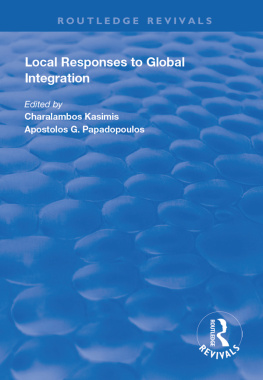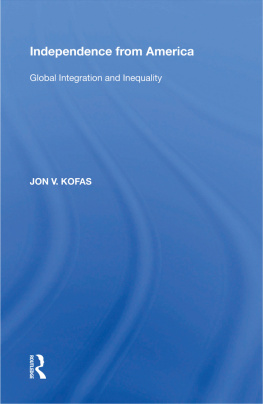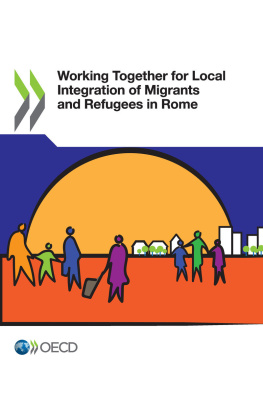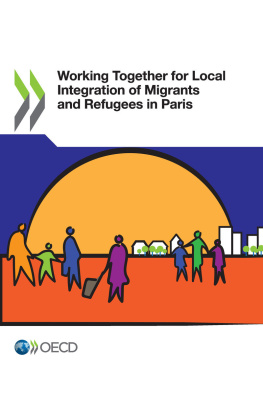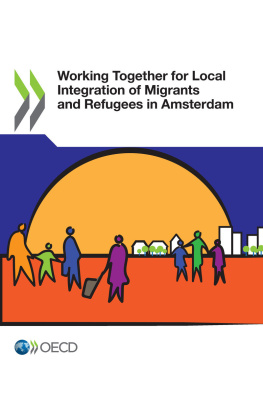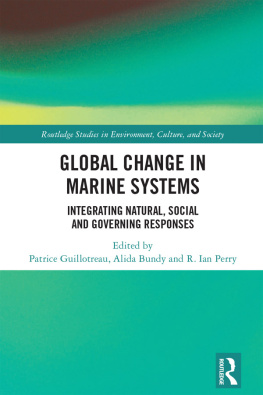LOCAL RESPONSES TO GLOBAL INTEGRATION
Local Responses to Global Integration
Edited by
CHARALAMBOS KASIMIS
Department of Economics
University of Patras
Patras, Greece;
Institute of Urban and Rural Sociology
National Centre for Social Research
Athens, Greece
APOSTOLOS G. PAPADOPOULOS
Institute of Urban and Rural Sociology
National Centre for Social Research
Athens, Greece
First published 1999 by Ashgate Publishing
Reissued 2018 by Routledge
2 Park Square, Milton Park, Abingdon, Oxon OX14 4RN
711 Third Avenue, New York, NY 10017, USA
Routledge is an imprint of the Taylor & Francis Group, an informa business
Copyright European Society for Rural Sociology 1999
All rights reserved. No part of this book may be reprinted or reproduced or utilised in any form or by any electronic, mechanical, or other means, now known or hereafter invented, including photocopying and recording, or in any information storage or retrieval system, without permission in writing from the publishers.
Notice:
Product or corporate names may be trademarks or registered trademarks, and are used only for identification and explanation without intent to infringe.
Publishers Note
The publisher has gone to great lengths to ensure the quality of this reprint but points out that some imperfections in the original copies may be apparent.
Disclaimer
The publisher has made every effort to trace copyright holders and welcomes correspondence from those they have been unable to contact.
A Library of Congress record exists under LC control number: 99073346
ISBN 13: 978-1-138-33385-7 (hbk)
ISBN 13: 978-0-429-44573-6 (ebk)
Contents
Charalambos Kasimis and Apostolos G. Papadopoulos
Gran Therborn
Gaston Remmers
Geoffrey Lawrence, Ian Gray and Daniela Stehlik
Luis Llamb, Elizer Arias and Germn Freire
Sally Shortall
Pawel Starosta and Mariana Draganova
Esperanza Vera-Toscano and Pollyanna Chapman
Perpetua McDonagh and Patrick Commins
Nicholas Mack
Petri Ruuskanen
Apostolos G. Papadopoulos
Elizer Arias, Venezuelan Institute of Scientific Research, Caracas, Venezuela.
Pollyanna Chapman, University of Aberdeen, Aberdeen, Scotland, UK.
Patrick Commins, Rural Policy Research at Teagasc, The Agricultural and Food Development Authority, Dublin, Ireland.
Mariana Draganova, Institute of Sociology, Bulgarian Academy of Sciences, Sofia, Bulgaria.
Germn Freire, Venezuelan Institute of Scientific Research, Caracas, Venezuela.
Ian Gray, Charles Sturt University, Wagga Wagga, New South Wales, Australia.
Charalambos Kasimis, Department of Economics, University of Patras, Patras, Greece; Institute of Urban and Rural Sociology, National Centre for Social Research, Athens, Greece.
Geoffrey Lawrence, Central Queensland University, Rockhampton, Queensland, Australia.
Luis Llamb, Venezuelan Institute of Scientific Research, Caracas, Venezuela.
Nicholas Mack, Action Research Unit, Rural Development Council for Northern Ireland, Cookstown, Northern Ireland, UK.
Perpetua McDonagh, Rural Economy Research Centre at Teagasc, The Agricultural and Food Development Authority, Dublin, Ireland.
Apostolos G. Papadopoulos, Institute of Urban and Rural Sociology, National Centre for Social Research, Athens, Greece.
Gaston Remmers, Department of Sociology, Wageningen Agricultural University, Wageningen, The Netherlands.
Petri Ruuskanen, Chydenius-Institute, University of Jyvskyl, Jyvskyl, Finland.
Sally Shortall, Department of Sociology and Social Policy, Queens University Belfast, Belfast, Northern Ireland, UK.
Pawel Starosta, Institute of Sociology, University of Lodz, Lodz, Poland.
Daniela Stehlik, Central Queensland University, Rockhampton, Queensland, Australia.
Gran Therborn, Swedish Collegium for Advanced Study in the Social Sciences, Uppsala, Sweden; University of Gteborg, Gteborg, Sweden.
Esperanza Vera-Toscano, Arkleton Centre for Rural Development Research, University of Aberdeen, Aberdeen, Scotland, UK.
The European Society for Rural Sociology held its 17th Congress entitled Local responses to global integration: Towards a new era of rural restructuring in Crete in August 1997. The Congress theme set the context in which it was discussed whether globalization, as an economic and social process, has taken a more pervasive form, leading to an increasing similarity of production and consumption patterns and a world wide movement of products, people, services and cultures. However, it was indicated that such a development has not necessarily led to an all-embracing homogenization process.
Rural areas have undoubtedly experienced the impact of such a process adopting new functions as both producers and consumers. Their roles today are not characterized by uniformity; integration or resistance being rather a reflection of their accumulated history. In other words, the crisis of the regulatory framework has led to a reconsideration of globality as expressed so far. In the Congress it was revealed that new forms of production and consumption have developed and localities, as specific social spaces, have put forward their own diversities, seeking their own autonomy of being.
This book publishes a selection of papers presented at the Congress which best reflects the Congress theme and the issues raised above. One of the main criteria for our final selection was the diversity of theoretical and methodological approaches used. As a result, authors from Australia, Bulgaria, Finland, Greece, Ireland, the Netherlands, Poland, Sweden, the United Kingdom and Venezuela are represented with their research work touching upon an even wider spectrum of countries.
We gratefully acknowledge the support of the National Centre for Social Research (EKKE) in Greece for this publication of this volume. Special thanks go to Vaggelis Zouridis for his work connected with the technical preparation of the book and to Voula Galinou for her language and other editorial help. Finally, we would like to thank all the contributors to this edition who patiently worked with us over the past year.
C. Kasimis
A.G. Papadopoulos
CHARALAMBOS KASIMIS AND APOSTOLOS G. PAPADOPOULOS
Globalization: the concept and the arguments
Reference to the global aspect of economic, social, political and cultural processes has been very popular in the majority of analyses of the 1990s. The concept of globalization conditions the whole discussion concerning the social and economic restructuring of different localities and/or regions in any part of the globe. Moreover, in many treatments the globalization process is used as a shorthand for describing the character of rapid changes occurring across the globe, referring to the increasing inter-connections among different localities, practices and systems as well as illustrating the impact of particular incidents or processes which have occurred in specific areas upon the rest of the world. Often the globalization process is considered as an exogenous factor to particular localities, thus stressing the significance of macro-structures and macro-processes for explaining micro-instances and/or concrete cases. Moreover, it is based upon an implicit assumption of an increased concentration of power (e.g. economic, political, cultural), which tends essentially to push towards the intensification of integration processes within wider social and economic contexts. In respect with the impact of globalization upon specific localities it is normally considered that the latter are based upon wider processes and interdependencies for their existence and that the world space is the arena for local action (indicative is the expression, think globally act locally Holton, 1998, p. 18). The primacy of the global space over the local is stressed by the inter-connectivity and networking of localities and the domination of trajectories leading to a formation of a global economic and social system.


